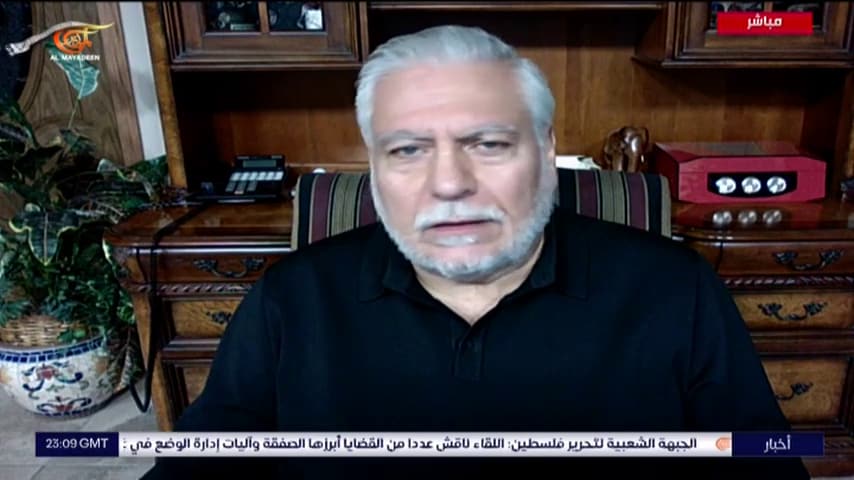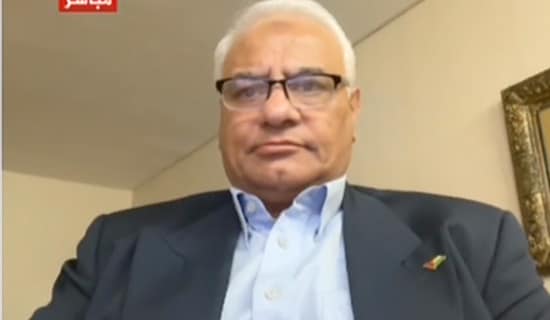
On May 8, 2020, Al-Jazeera Network (Qatar) published a podcast titled "Soleimani... Iran's Spearhead", about IRGC Qods Force Commander Qasem Soleimani, who was killed in a U.S. airstrike in January 2020. The podcast, which lauds Soleimani and portrays him in a positive light, is an installment of "Rumooz [Leaders]", a podcast series that uses a first-person narration format to tell the stories of people who have had an impact on society. In the podcast, "Soleimani" describes his patriotism and his commitment to justice, and he talks about his career in the IRGC, about the IRGC's cooperation with Hizbullah, Hamas, and the Islamic Jihad, and about his personal involvement in fighting U.S. forces during the Iraq War.
Narrator: "I am Qasem Soleimani, the soldier who dedicated his life to serve Islam and to serve the Islamic Revolution, its greatness, and its honor. I am Soleimani, the soldier waging Jihad for the sake of Allah, commander of the Qods Force in the Iranian IRGC – the name that the Great Satan and the Zionist enemy fear.
[...]
"I praise Allah for purifying my heart from love of this world and granting me my loftiest wish -martyrdom for His sake.
[...]
"This [noise] is the roar of the crowds of the revolution – the Islamic Revolution against the Shah. It was launched by Imam Khomeini, the most honest religious scholar. He shook the pillars of the world and revived Islam. Our dear Imam Khomeini turned the Rule of the Jurisprudent into the only prescription that could save this Islamic nation. He steered Iran towards the service of Islam and he fortified the path of confrontation with America and of protecting Muslims who are under the injustice of arrogance
[...]
"We had to avenge the blood of the oppressed Iranians, who were being martyred in the cities. This is why I hurried to join the IRGC which was established in order to protect the revolution. [I joined] on May 1, 1980.
[...]
"My loyalty to the Revolution and its values, together with my distinction in handling the security portfolio with Afghanistan, during the Taliban's rise to power, particularly after it took over Kabul in 1996, led the leadership to decide to promote me and to appoint me as the commander of the Qods Force of the IRGC, replacing General Ahmad Vahidi in 1998. It was a great responsibility to command the force charged with paving the way for the liberation of Palestine."
Woman: "You mean [to say] that your military branch is in charge of expanding Iran's influence in the Arab Mashriq and the Gulf by means of your proxies."
Narrator: "This force was established in order to serve the resistance movements against the Zionist entity and to support them, according to Imam Khomeini's will. That is the main goal of the Islamic Revolution, which bears the values of justice and of confronting arrogance and oppression in the world - [including] the American puppets in the region. We strive to be worthy of our name. Hizbullah, Hamas, and the Islamic Jihad are our brothers and partners in the resistance against the Zionist entity. They are definitely not our proxies.
[...]
"The American invasion of Iraq constituted a new turn in my path of Jihad. The Americans [invaded Iraq] after [they invaded] Afghanistan in 2001, and they were present on our western and eastern borders. That is where my first confrontation with them began. I could not allow them to fulfill their dream of making Tehran - or even our ally Damascus - their next target."
Woman: "But you benefited [when] the U.S. toppled two of your enemies in less than two years - the Taliban movement and Saddam Hussein. Didn't you yourself exchange text messages with David Petraeus, the commander of the U.S. forces in Iraq?"
Narrator: "You accept every little accusation made by our enemies. It is true that the Americans toppled two of our enemies, but they did this in order to besiege us.
[...]
"We supported the resistance movements in Iraq, with the Badr Brigades at the forefront. [We knew that] the Americans are cowards and that they must leave. I was present in Baghdad, in Erbil, and all over Iraq. I supported our allies and negotiated to resolve the conflict that arose among them. I always knew that I was under the surveillance of the American forces."
[...]
Woman: "You ruled over Iraq, whose leadership feared your interference and violence. You also ruled over Lebanon and used it in your struggle against the Americans and the Israelis."
Narrator: "I did nothing but support Lebanon and its resistance against the Zionist enemy, alongside my brothers Imad Mughniyeh and Hassan Nasrallah. Ahh, Imad..."
[...]
Woman: "Then you came back and participated in the destruction of Syria by supporting the [Assad] regime. You worked on enhancing the sectarian division within Arab societies. Doesn't that count as a stain on your record?"
[...]
Narrator: "We have been paying close attention to what happened in Syria and to what is still happening. We understand very well how the events began, how things evolved, and how they spun out of control. We know there were some legitimate and rational demands made by some cities in Syria, but at the same time, we know the magnitude of the attack and the conspiracy that Syria faces from America and the Zionist entity."
[...]
Woman: "General Soleimani, in Iraq you are given the credit for destroying the myth of ISIS. However, isn't that an exaggeration? Wasn't your intervention in Iraq, Syria, and the entire region the reason behind the creation of this organization and the intensification of the danger it posed?"
Narrator: "We stood by all Iraqis in their resistance against the American occupation. We did not discriminate between citizens on a sectarian basis, whether Shiite or Sunni. We do not discriminate between Muslims. We are certainly not responsible for the creation of ISIS. It is like all the other takfiri organizations, on which the arrogant Americans and the West rely to spread civil strife within the [Islamic] nation.
[...]
"On January 3, 2020, the American enemies got the better of me, along with my brother and longtime companion, the soldier of justice, PMU Deputy Chief Abu Mahdi Al-Muhandis. Cowards as always, they did not have the courage to confront me face to face. Instead, they used their air force to bomb my car."














